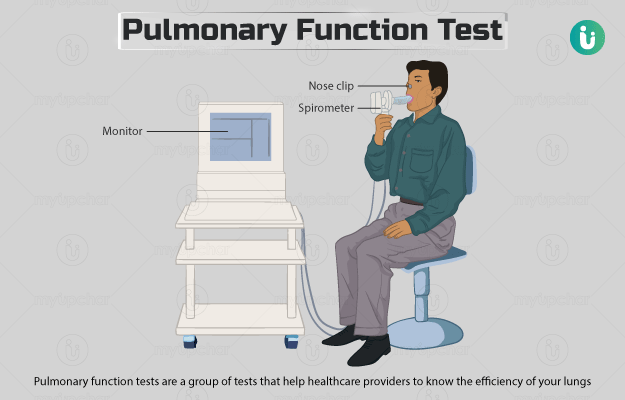What are pulmonary function tests (PFTs)?
Pulmonary function tests (PFTs) are a group of tests that help healthcare providers to know the efficiency of your lungs.
Some of these parameters are as follows:
- Total lung capacity (TLC): It is the overall volume of lungs when filled the most with air.
- Tidal volume: It is the volume of air that is either breathed in or out at once.
- Vital capacity: It is the total volume of air that can be exhaled after fully breathing in.
- Residual volume (RV): It is the volume of air left after exhaling most of the air.
- Minute volume: It is the total air that is breathed out in a minute.
- Functional residual capacity (FRC): It is the quantity of air left in lungs after breathing out fully.
- Forced vital capacity (FVC): It is the volume of air, which is exhaled forcefully and quickly after fully breathing in. Using this parameter, we can detect:
- Forced expiratory flow (FEF): It is the average rate of flow measured in the middle of the FVC test.
- Forced expiratory volume (FEV): It is the amount of air exhaled during the first three seconds of the FVC test.
- Peak expiratory flow rate: The fastest rate of forcefully exhaling air out of the lungs.
- Diffusion capacity of lung for carbon monoxide (DLCO): The gas carbon monoxide is to be inhaled in this test - this gas follows the same pathway as oxygen but has a high affinity for haemoglobin. The difference in the quantity of gas inhaled and respired gives the diffusion of gas through the lungs into the blood.
This test is performed in two ways:
- Spirometry: In this test, a mouthpiece is attached to a device called spirometer is used to measure the airflow in your lungs (how much air you breathe in and out).
- Plethysmography: An airtight box that looks like a phone booth is used to perform plethysmography. This test helps determine lung volume by reading the changes in pressure inside a box while you inhale into it.








































